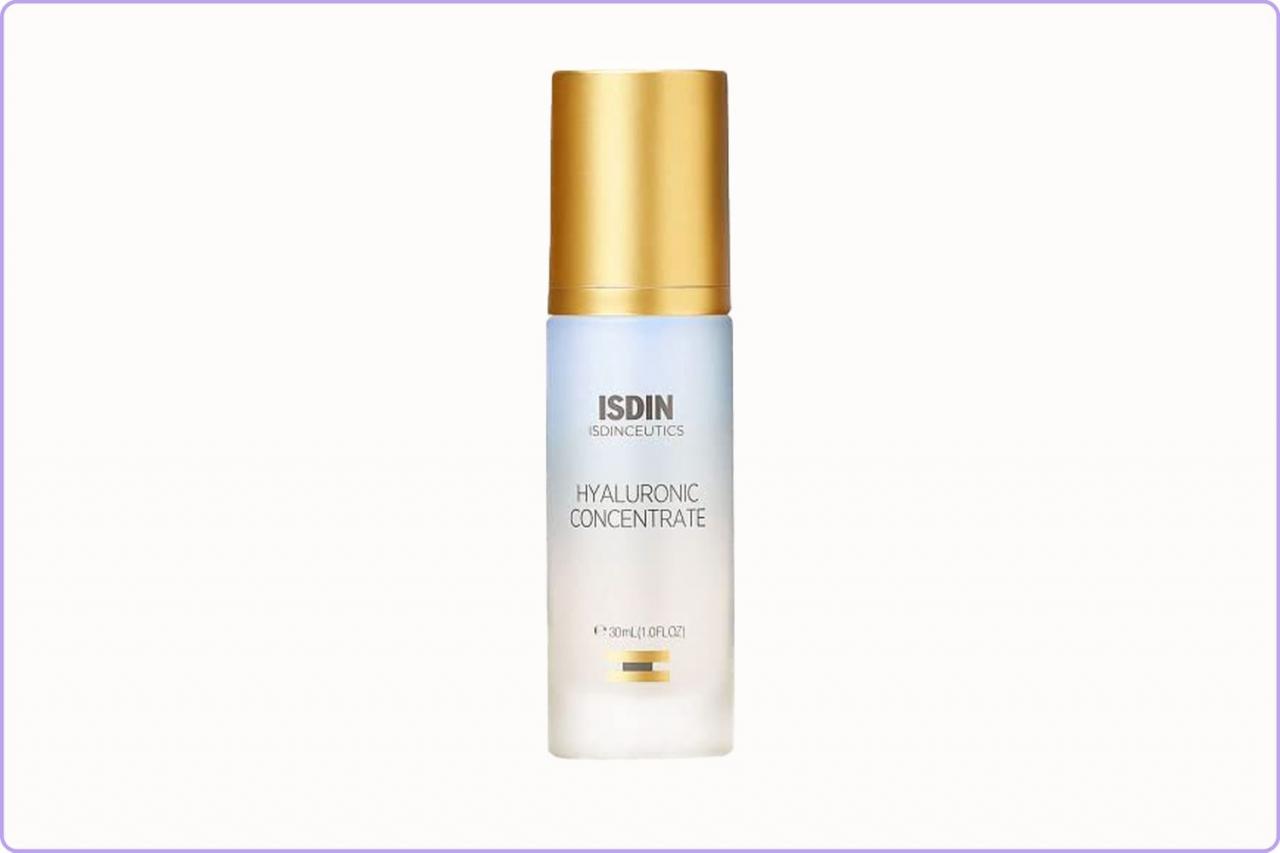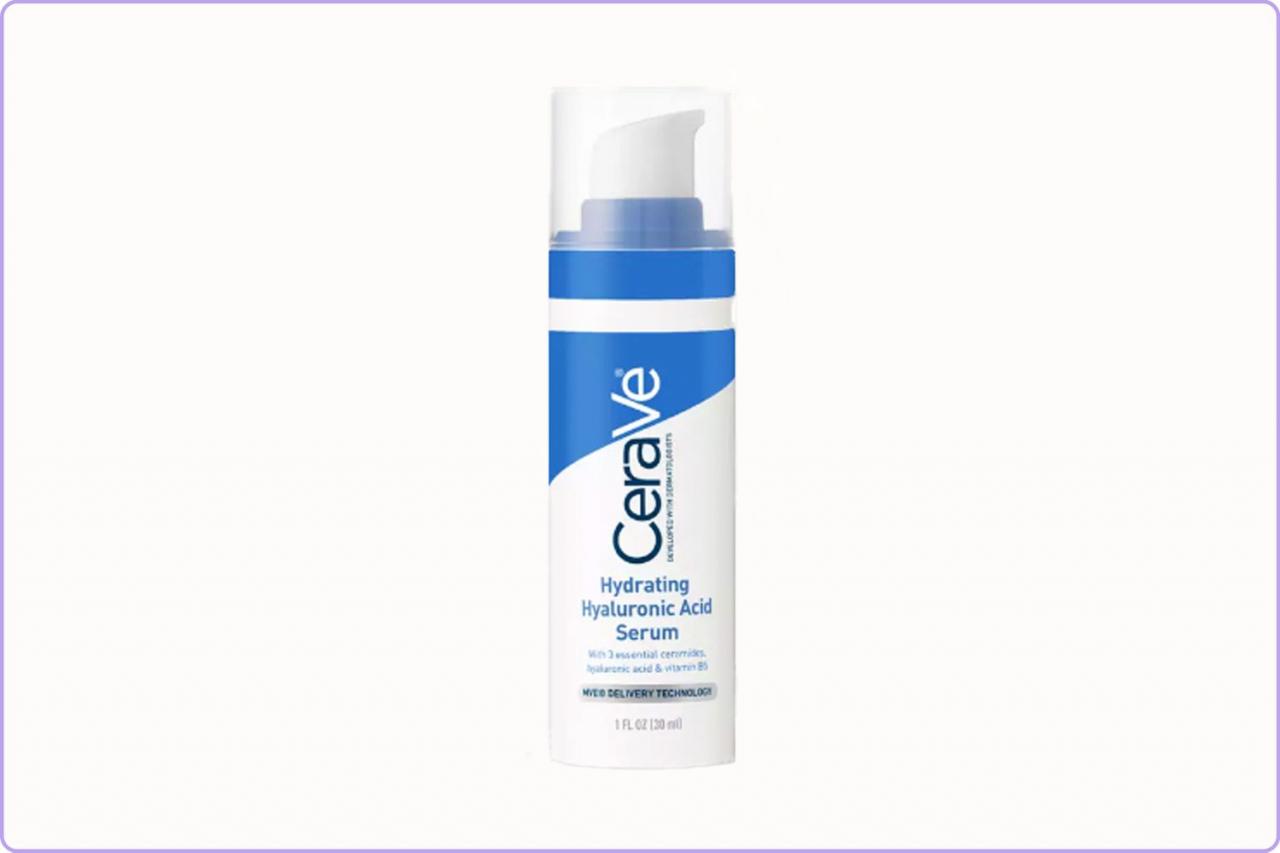Hyaluronic acid—also known as hyaluronan or hyaluronate—is a molecule that’s found throughout the body. The substance is found naturally in the skin, connective tissue, joint fluid, umbilical cord, and inside the eye. Hyaluronic acid is a humectant, meaning it binds to water to make a jelly-like liquid that helps lubricate and protect these body parts.
The molecule is also manufactured in a variety of forms, including pills and serums. Healthcare providers can also administer hyaluronic acid through injections. Chemists generally make hyaluronic acid by fermenting bacteria, but the substance can also be sourced from the tissue of the fleshy red combs that sit atop rooster heads.
Benefits of Hyaluronic Acid
Humans begin producing less hyaluronic acid naturally at around age 20. Over time, the decreased production leads changes like drier skin and the formation of wrinkles. Research shows that a hyaluronic acid boost can help the body in a variety of ways, from enhancing appearance to improving common conditions.
Hydrates and Rejuvenates Skin
Hyaluronic acid is commonly used as a skincare ingredient to make skin appear more supple, and a bulk of evidence suggests it can do the job.
For instance, one small study found that people who applied a hyaluronic acid serum and lotion mixture followed by a hyaluronic acid cream twice a day appeared to have smoother skin that was more hydrated and elastic after two weeks. The study showed significant improvements in the appearance of wrinkles, as well as in skin hydration and skin firmness after eight weeks of the treatment.
Dietary supplements may also improve skin's appearance. One study of 60 people in Japan found that ingesting 280 milligrams of hyaluronic acid daily for eight weeks resulted in less pronounced wrinkles than taking a placebo. Another later study had similar findings. However, in both studies, some of the authors were employed by the company funding the research.
Other research on the effects of oral hyaluronic acid on skin have been promising as well, but they too have been conducted by the supplement's manufacturer or were done in combination with other ingredients.
Injectables containing a gel-like form of hyaluronic acid can go deeper into the skin, drawing and holding in moisture to more dramatically plumpen the face and soften wrinkles. Research reports that many people who received a facial filler were “highly satisfied” with the results.
Heals Wounds
In the body, hyaluronic acid is involved in every stage of wound healing as it can help regulate inflammation and stimulate tissue growth. As a commercial product, it also appears to have some curative power.
One study showed that rubbing gauze containing hyaluronic acid onto the venous leg ulcers of 50 people helped the wounds heal faster than gauze alone.
Additionally, research shows applying hyaluronic acid inside the mouth may help heal ulcers and reduce post-dental surgery pain.
May Lighten Acne Scars
Some research shows hyaluronic acid may approve the appearance of acne scars. One study found that participants with acne scars who used topical hyaluronic acid in combination with carbon dioxide laser resurfacing (a skin treatment using laser light pulses) had better results than people who had carbon dioxide laser resurfacing alone.
There is some evidence that hyaluronic acid injections can also lighten acne scars. Research has found the appearance of moderate to severe acne scars improved when hyaluronic acid was injected two or three times, four weeks apart.
Relieves Dry Eye Symptoms
Eye drops are the most common treatment for dry eye—the inability to produce enough tears to lubricate the eye. Many of these drops contain hyaluronic acid, which research shows can effectively treat the condition when the drops contain .1% to .4% hyaluronic acid.
Hyaluronic acid may also prevent inadequate tear production when added to contact lenses. Similarly, applying the substance to the eye before and after cataract surgery may prevent the procedure from triggering dry eye.
Combats Vaginal Dryness
Research has examined how well hyaluronic acid moisturizers and gels work to reduce vaginal dryness. This condition can make sex painful and most often occurs during or after menopause when estrogen levels drop.
One study found that hyaluronic acid works just as well as vaginal estrogen, a common and effective treatment. The researchers suggested hyaluronic acid may serve as a non-hormonal treatment for vaginal dryness.
May Ease Bladder Pain
Hyaluronic acid may help treat bladder pain in certain conditions.
One study found that inserting a hyaluronic acid solution into the bladder for six months improved pain associated with interstitial cystitis, a chronic condition resulting in pain and pressure in the bladder area. However, previous research has reported mixed results on the effectiveness of hyaluronic acid to treat this condition.
Reduces Joint Pain
When produced naturally, hyaluronic acid helps reduce and prevent joint pain by decreasing inflammation and providing cushioning so there’s no friction where bones meet.
Research has found that taking hyaluronic acid supplements can help relieve mild knee pain associated with osteoarthritis, a degenerative disease in which joint tissues break down over time.
Other research has shown that hyaluronic acid injections (also called viscosupplementation) can only slightly reduce knee pain when compared to a placebo. That, along with the risk of serious adverse events they found the injections can bring, made the researchers question whether the benefit was worth the risk.
There’s some evidence that hyaluronic acid injections may also reduce hip pain, but unlike products that aim to curb knee pain, the U.S. Food and Drug Administration (FDA) hasn’t approved them for this purpose. Injections also show promise for easing ankle pain or frozen shoulder, but more evidence is needed to say for sure.
How To Use Hyaluronic Acid
People use hyaluronic acid in a variety of ways. As a consumer product, the molecule is available in three major forms:
Topical Treatments: Hyaluronic acid is added to over-the-counter products such as eye drops and contact lenses, as well as creams, gels, and inserts (suppositories) used to treat vaginal dryness. The molecule is also often combined with other ingredients in the form of creams, serums, lotions, gels, and powders.
Products typically recommend washing your face before use and applying one or two times a day to damp skin. If using a serum, applying a moisturizer afterward can help lock in the hyaluronic acid.
Oral Supplements: Designed to reduce pain or hydrate the skin, oral hyaluronic acid supplements are offered online and in drug stores as tablets, capsules, softgels, powder, and gummies. Result times vary from person to person and depending on the product. However, research has shown the supplements can improve the skin’s appearance within eight weeks.
Injections: A healthcare professional can inject hyaluronic acid directly into the joints, bladder, or specific parts of the face, such as the cheeks, lips, and forehead. The results can last between six and 18 months for facial fillers and up to six months for joint injections.
Dosage
There are no universal dosage recommendations for using hyaluronic acid topically or taking it orally. When using an over-the-counter product, follow the dosing instructions the manufacturer recommends. A healthcare provider can also suggest a safe and effective dosage based on your individual circumstances.
Is Hyaluronic Acid Safe?
Hyaluronic acid is generally safe when used as directed orally and topically. Injections of hyaluronic acid come with certain risks and side effects. It's important to talk to your healthcare provider about these concerns before getting an injection.
However, you should avoid hyaluronic acid in any form if you're:
Allergic to hyaluronic acidSensitive to hyaluronic acidPregnantBreastfeeding Potential Drug Interactions
There is no evidence of negative interactions between hyaluronic acid and other drugs. However, it’s best to discuss this possibility with a healthcare provider before taking or using hyaluronic acid.
When receiving a hyaluronic acid injection, your healthcare provider may recommend stopping the use of medications or supplements that can increase the risk of bleeding up to one week before the procedure. This may include aspirin, nonsteroidal anti-inflammatory drugs (NSAIDs), St. John’s wort, and ginkgo biloba.
What To Look For
Because the FDA doesn’t regulate oral supplements, it can be difficult to determine which products to trust. However, a few independent organizations test supplements to show that they contain what’s on the label. Look for a stamp from the U.S. Pharmacopeia, ConsumerLab, or NSF International.
Skincare products are similarly unregulated in the U.S., but a healthcare provider can offer suggestions for what to look for on a label. Dermatologists typically recommend looking for products with a concentration of hyaluronic acid of less than 2%. You can also look for the ingredient sodium hyaluronate, a lower-weight molecule of hyaluronic acid used in products that research has found to be effective.
Injections—whether in the face or knee—must be performed by a licensed healthcare professional. There are a variety of brands, each with their own injection schedules, so it’s important to discuss the pros and cons of each with a healthcare provider.
Can You Use Too Much Hyaluronic Acid?
It's unlikely that using or taking too much hyaluronic acid will harm you if you're not allergic or sensitive to the ingredient. Most people won’t have adverse effects from ingesting too much hyaluronic acid because it’s unlikely to build up at excessive levels—about 90% of the molecule is metabolized and released through sweat and urine.
In general, it’s best to have a discussion with a healthcare provider before taking supplements or using any hyaluronic acid products.
Product Recommendations
To find the best hyaluronic acid serums, we enlisted the help of dermatologists to learn what makes for a great one, and then tested more than two dozen options over six weeks for effectiveness, absorption, consistency, and hydration. Read our full list of recommendations here.
Isdin Isdinceutics Hyaluronic Concentrate 
Courtesy Dermstore
This light but luxurious-feeling option dramatically helped our tester’s normally-dry skin—which makes sense, because experts like it too.
Buy on Amazon CeraVe Hydrating Hyaluronic Acid Serum 
Courtesy of Ulta
This hyaluronic acid serum is affordable, and, in testing, was just as effective as much pricier options.
Buy on Amazon Side Effects Of Hyaluronic Acid
Topical and supplemental uses of hyaluronic acid do not appear to have any side effects. When using a new skincare or oral product, you may experience irritation or develop a reaction if you're sensitive or allergic to an ingredient.
Although over-the-counter hyaluronic acid is considered safe, there are some risks associated with using it as a prescribed injection. The most common side effects from hyaluronic acid injections involve mild reactions at the injection site, including short-term bruising, itching, and swelling.
Typically, these side effects should only last up to a week and can be managed by applying an ice-pack to the injection site and keeping the area upright.
More rarely, improper sanitizing before the injection may cause a bacterial infection. Rashes, muscle pain and cramps, increased joint pain, and nausea have also been reported by people who’ve received knee injections. There is also a risk of intravascular injection, a medical emergency that can cause tissue loss and blindness.
A Quick Review
Hyaluronic acid is a naturally occurring substance in the body that hydrates and lubricates skin, joints, the eyes, and more. Humans lose hyaluronic acid production with age, but it's possible to increase the body's supply by taking dietary supplements or using a topical treatment. Some people might also have a healthcare provider inject manufactured hyaluronic acid.
Hyaluronic acid products available straight to consumers in stores have shown many potential benefits, such as hydrating and adding volume to skin, reducing joint pain, healing wounds and lightening scars, relieving dry eye symptoms, and combatting vaginal dryness.
Hyaluronic acid is generally safe to use, and side effects are rare. However, it's best to speak to a healthcare provider before trying hyaluronic acid.